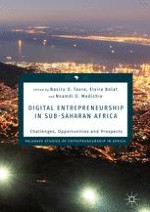2019 | OriginalPaper | Chapter
7. Technopreneurship: A Discursive Analysis of the Impact of Technology on the Success of Women Entrepreneurs in South Africa
Author : B. N. O. Irene
Published in: Digital Entrepreneurship in Sub-Saharan Africa
Publisher: Springer International Publishing
Activate our intelligent search to find suitable subject content or patents.
Select sections of text to find matching patents with Artificial Intelligence. powered by
Select sections of text to find additional relevant content using AI-assisted search. powered by
